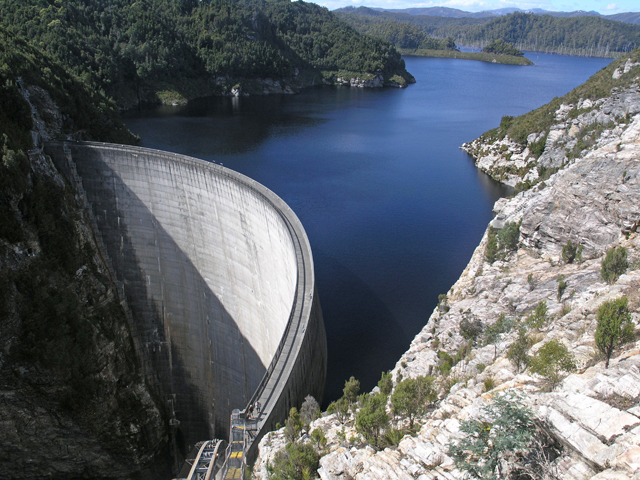Will it take a full-blown energy crisis for Tasmania’s leadership to shake off its complacency?

Lake Gordon. PHOTO Peter Boyer
We expect a lot of our leaders. We want them to fix today’s contingencies while also thinking ahead to long-term solutions. And we want them to take responsibility when bad things happen.
Well, bad things are now happening to Tasmania’s much-vaunted clean energy. Will Hodgman and his energy minister, Matthew Groom, are in charge of what’s building to a crisis.
Dismissing such talk, they have reminded us that a revived Tamar Valley Power Station and new transportable diesel generators will fill the void left by a failed Basslink. But these are stop-gap measures which don’t begin to address systemic energy problems.
Having overseen the shut-down of Tamar Valley’s base-load combined cycle gas turbine in mid-2014, the government announced last August that it had approved the turbine’s decommissioning and sale to “allow Hydro to rid itself of a redundant liability and reduce its debt.”
At the time we still had Basslink to fall back on and dam storage levels were not much lower than they were 12 months earlier. A cash-strapped Hydro Tasmania needed money and advised the government to sell. Not unreasonable, it could be argued.
But when the decision to sell was made dam storage levels hadn’t risen above 35 per cent for a whole 18 months. In that light, Tamar Valley power doesn’t seem so redundant.
I doubt the government gave much thought to the fact that Basslink was delivering the dirtiest form of coal power. Victoria must account for resulting emissions because that’s where the coal was burned. But it’s clearly Tasmania’s responsibility, and we should stand up and say so.
The Hodgman government should also have accepted responsibility for the turbine sale – the records make clear that this was its intention – then explained how the Basslink failure had changed things and focused on what to do now.
But in an interview with Radio 7AD’s Brian Carlton, Matthew Groom said Hydro’s orders were to “explore” a “potential” sale under “very strict conditions, including that we be satisfied on energy security matters”.
When Carlton drew attention to the fact that the August sale announcement contained no mention of any of this, Groom responded that “what I’m telling you Brian is what actually happened”.
Without documented evidence Groom was foolish to go down this track. Whatever the truth, he was bound to emerge from the interview a loser, and did.
It was welcome relief to hear Hydro Tasmania’s admission last week that it was in “uncharted waters”. The company said that storages, now around 16 per cent, could “theoretically” go down to 6.5 per cent, but “this hasn’t before been done in practice and unanticipated problems may arise.”
Uncharted waters indeed. If Basslink remains unavailable deep into autumn and if big westerly rains don’t materialise, not even Groom will be able to deny a crisis, but unfortunately that seems the only way to shake him and his leader out of their complacency.
They keep saying they’re committed to sustainable energy and a low-carbon economy, but nothing they’ve said or done in government backs that up. Meanwhile other jurisdictions, notably South Australia and the ACT, are charging ahead with long-term renewable energy development.
The Basslink failure is going to be very expensive, not least in the cost of diesel. Diesel-fuelled King Island can attest to that. But for long stretches since last November the island has enjoyed diesel-free electricity thanks to an innovative renewable energy management system.
Hydro Tasmania employed cutting-edge research by a University of Tasmania team under Professor Michael Negnevitsky to set up the system, which allows intermittent power from wind, solar and other sources to be integrated to provide something approaching base-load power for the island.
Negnevitsky’s research team and our time-honoured hydro-electric system are each testament to Tasmania’s ability to find innovative, lasting solutions to energy problems. Surely Matthew Groom and his leader can see that?
Both must somehow find the vision that, in time, will enable us to wear our clean, green badge with genuine pride. Until then we’re just papering over growing cracks and stumbling along in others’ wake.
